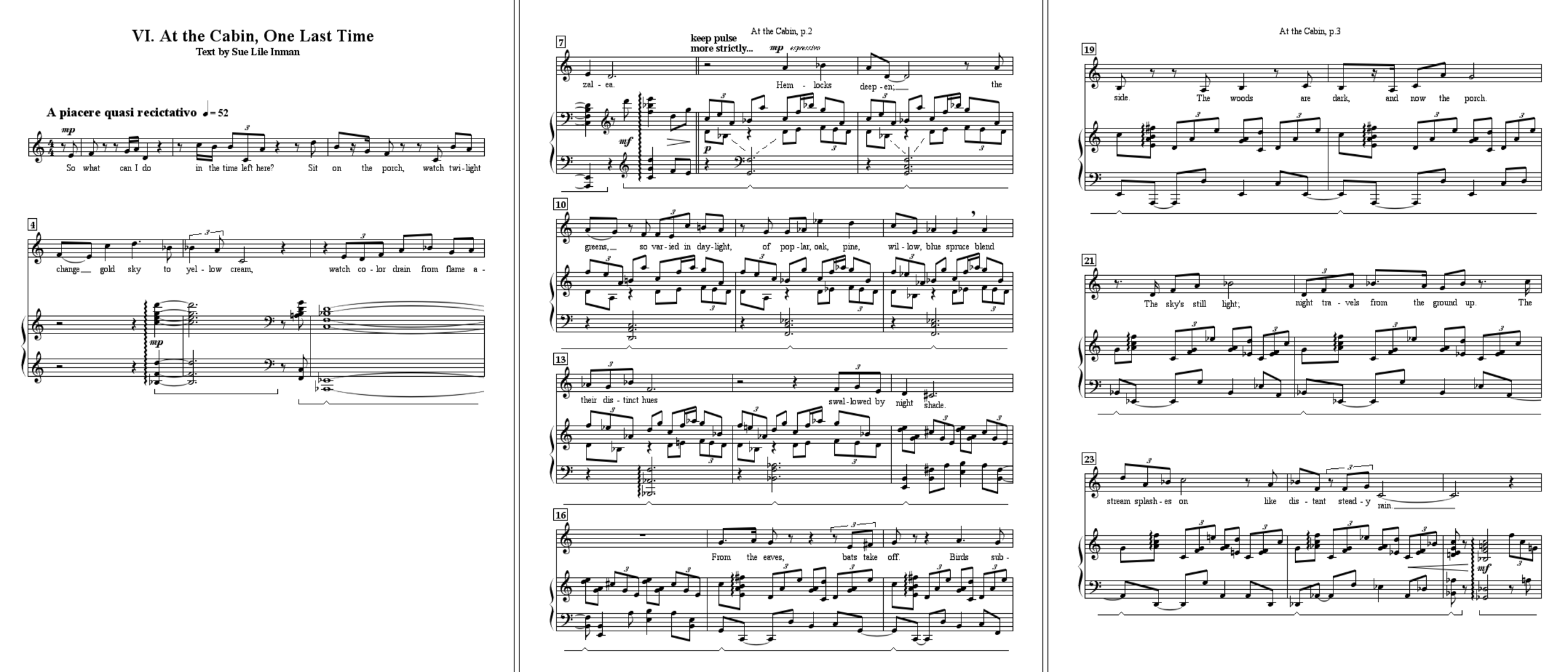Pisgah Songs (2012)
For mezzo soprano. These poems – save the last – are taken from Climbing Pisgah, an album of poetry and photography of Pisgah National Forest in western North Carolina, published in 2007 by Cedar Mountain Books. The beautiful photographs are by T. Stuart Gaston and all poems are by the four authors included here. These four were part of the small nucleus of writers who launched the Emrys Foundation, a Greenville, SC-based support group for area writers and related artists, in 1982. The organization has been a pillar of support for artists of many stripes and today continues its vital work as part of the arts community in Greenville. Overall range A3-Gb5. Available from North Star Music.
I. Looking Glass (Keller Cushing Freeman) A warm vision of a cold landscape, this text could just as well have been about winter in the west Michigan woods where I spent my teens. The high-pitched swaths of color in the piano attempt to capture the sensation of snow and ice bathed in sunlight. About 2:40; range D4-E5.
II. Black Mountain (Marian Willard Blackwell) Wintry sounds not unlike the first song, this time making a simple statement of concern for this delicate beauty. About 1:15; range D4-E5.
III. Long After Our Footprints (Jan Bailey) A joyous walk in the woods with many fine sightings along the way, ending in a note of regret that such times are relegated to a secondary role in busy lives. The brief (and recurring) introductory piano melody melds the songs of the black-capped chickadee and the myrtle warbler. About 2:05; range E#4-F#5.
IV. No Straight Path / The Grammar of Spring / No Straight Path (reprise) (Marian Willard Blackwell) This is set in quintuple meter, quirky harmony, and zig-zag melodies to suggest the uneven terrain – challenging perhaps, but worth the effort – on the way to the destination. A second poem, The Grammar of Spring, is offered in the middle as the destination and set in lush harmony and quiet, gauzy texture to complement its intense introspection. (the original title of the poem in No Straight Path is Mountain Triolet, a reference to its 17th century French form with the rhyme scheme abaaabab.) The song finishes with a brief reprise of No Straight Path. About 3:45; range Bb3-A5.
V. Laurel Creek (Sue Lile Inman) Low, dark, quiet and turgid to evoke one of those beautiful, rocky mountain streams shaded with hemlocks and laurels. A gentle and innocent surprise invades this rich environment near the end. About 2:50; range A3-D5.
VI. At the Cabin, One Last Time (Sue Lile Inman) A day-dreamy meditation on a cherished place, ending in night sounds of the forest. Is the speaker at the cabin or reminiscing much later? Is it really a cabin? About 2:55; range A3-Eb5.
VII. Blue Mountain Breakdown (Keller Cushing Freeman) This poem, written specially for this set of songs, poses difficult questions. Do we really understand what is going on? Do we understand our mistakes? Do we comprehend what we stand to lose? A tense and brutal series of dark images ends eventually in a quiet nightmare – like all nightmares, one that any sane person would wish to avoid. About 4:35; range C4-Gb5.







